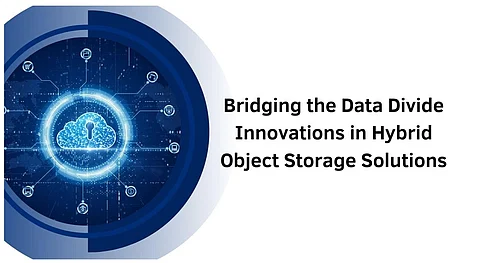

In an era of relentless data expansion, businesses are grappling with the challenge of efficiently managing, storing, and securing vast volumes of information. Venkatachala Nivas Chainuru, a leading expert in data storage architecture, explores how hybrid object-based storage solutions are revolutionizing enterprise data management. His research sheds light on the key innovations that are bridging on-premises infrastructure with cloud scalability, enabling organizations to optimize cost, performance, and regulatory compliance.
The ubiquitous expansion of unstructured data has far exceeded the confines of traditional storage, thus necessitating solutions more flexible and scalable in nature. Hybrid storage solutions unite on-premises infrastructure with the cloud, balancing between the three variables of performance, cost, and accessibility. In particular, hybrid object storage enhances the handling of data by grouping data into self-contained objects enriched with metadata enabling efficient retrieval and thereby scaling across distributed systems. Unlike traditional file or block storage, which relies on rigid structures, object storage lends itself to a more fluid and adaptable characteristic increasingly required by today's data-intensive applications.
On-premise hybrid storage guarantees that with cloud elasticity, the service will not be compromised since critical data access will always be available, secured, and redundant. This is an ideal scenario for organizations in charge of enormous unstructured datasets for maximum performance and minimum cost away from either cloud-only or on-premises storage models.
A key advantage of hybrid object storage is its unified management interface, offering enterprises a holistic view of their storage landscape. Managing petabytes of data across diverse environments becomes seamless with centralized control, improving visibility and operational efficiency. Studies show that organizations adopting unified management systems see a 30% reduction in administrative overhead, freeing IT teams to focus on strategic initiatives instead of routine maintenance.
By streamlining data governance and simplifying workflows, hybrid object storage enhances agility, ensuring enterprises can efficiently scale and adapt to evolving storage demands while optimizing resource utilization.
Hybrid storage's key advantage lies in intelligent data tiering, optimizing costs by categorizing data based on access frequency. Advanced algorithms analyze usage patterns, ensuring frequently accessed data resides in high-performance storage, while infrequently used data moves to cost-effective archival solutions.
This automated approach enhances system performance while significantly cutting storage expenses. On average, organizations reduce costs by 31%, with leading enterprises achieving up to 47% savings. By dynamically balancing speed and affordability, intelligent data tiering maximizes efficiency, making it an essential strategy for businesses managing vast data volumes in hybrid storage environments.
Hybrid architectures excel at handling fluctuating workloads by dynamically allocating resources based on demand. By leveraging both on-premises and cloud storage, businesses can balance latency-sensitive operations with cost-effective, long-term storage. Studies reveal that hybrid deployments outperform cloud-only solutions by 22.3% in throughput and reduce latency by 17.8%, ensuring enterprises can handle growing data loads without compromising efficiency.
A secure environment for data has now become critical in an era where many enterprises are confronting complex regulations. The collective strength of hybrid storage solutions lies in their capability for end-to-end encryption, role-based access control, and centralized key management for preventing intrusion. Such organizations that apply well-to-do encryption frameworks-and by very great margins-55% fewer security incidents occur as a result of deploying consistent encryption frameworks; while automated policy enforcement lowers potential violations in compliance by 37%.
So for the integrated and encompassing protection that comprises critical data and building compliance beside itself, an organization may train more towards the distributed architecture and manage the tipping point. This will allow merging on-the-ground operations in a hybrid-multi-cloud ecosystem.
Hybrid object storage extends a global reach to multi-national organizations with its storing of frequently accessed data locations nearer to end-users to reduce latency, optimize bandwidth, and speed up access by as much as 42% for international operations. Many companies also integrate hybrid architectures because they yield a performance consistency while storing replication costs 60-70% far fewer dollars. This makes seamless sharing and improves efficiency and responsiveness across global markets.
It allows enterprises to provision on-premise with cloud storage and enhance scalability and resilience. Optimized data placement and redundancy reduced hybrid storage therefore allow organizations to create efficient processes and digitization at a global level.
With enterprises now generating data at unheard-of rates, hybrid storage solutions will become the major lifeline for handling growth sustainably. Improvements in machine learning-based data classification, automated workload distribution, and adaptive tiering will considerably enhance hybrid environment efficiency. Organizations implementing such advancements will see a decrease in operational costs, better security, and improved scalability.
To conclude, Venkatachala Nivas Chainuru sheds light on the disruptive capabilities of hybrid object-based storage for many modern enterprises. By leveraging a combination of on-premises and cloud storage, enterprises are able to ensure that their data strategies are resistant to obsolescence and are able to best balance trade-offs in cost, performance, and compliance. Given that data growth is explosive, scaling, resiliency, and compliance are the key attributes that such hybrid storage solutions must deliver. Thus, they will constitute a linchpin of enterprise data management in the digital age.
